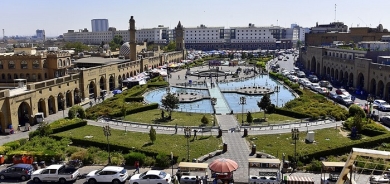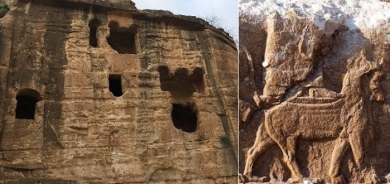Nine killed in election day violence as Yemenis vote to ensure Saleh’s exit

Vice President Abd-Rabbu Mansour Hadi, the sole, consensus candidate, billed the election as a way to move on after months of mass protests against Saleh’s rule, but the president’s sons and nephews still command key army units and security agencies.
“Elections are the only exit route from the crisis which has buffeted Yemen for the past year,” Hadi, Saleh’s long-time right-hand and former army general, said after casting his vote.
Micro-buses plastered in posters of Hadi and decked out with speakers sped around the capital Sana’a blaring out pop songs to shouts of “Vote to Save Yemen.”
“Today is the real fall of Ali Abdullah Saleh,” said 25-year-old college student Abdullah Ali after casting his vote at a crowded Sana’a University polling station near Change Square, the focal point of last year's mass protests demanding Saleh’s ouster.
The Arab world’s first female Nobel peace laureate, Tawakkul Karman, hailed Tuesday's poll as a “day of celebration” for Yemenis.
Karman told AFP the vote marked an “end to the despotism and oppression” of Saleh’s rule.
But in a reminder of the daunting task he faces in holding Yemen together, at least nine people were killed in election-related violence in the south of the Arabian Peninsula country, where secessionists had called for an election boycott.
The vote will make Saleh, now in the United States for more treatment of burns suffered in an assassination attempt last June, the fourth Arab autocrat in a year to be removed from power after revolutions in Tunisia, Egypt and Libya.
He leaves behind an economy in shambles, a rebellion in the north, separatism in the south, a tenacious Yemen-based wing of al Qaeda, and a divided military, in which his sons and nephews still command key units and agencies.
Long queues formed early in the morning outside polling stations in Sana’a amid tight security, after an explosion ripped through a voting center in the southern port city of Aden on the eve of the vote.
Voters dipped their thumbs in ink and stamped their finger print on a ballot paper bearing a picture of Hadi and a map of Yemen in the colors of the rainbow.
Turnout crucial for Hadi
A high turnout would give Hadi the legitimacy he needs to carry out changes outlined in a U.S.-backed power transfer deal brokered by Yemen’s Gulf neighbors, including the drafting of a new constitution, restructuring the armed forces and preparing for multi-party elections in two years’ time.
An official from the election security committee estimated a turnout of 80 percent, although final results will not be known for several days.
Turnout was likely to be lower in the south, where the boycott call and security concerns kept many at home. Election committee official Khamis al-Dayani said nine of some 300 polling areas in the country had experienced severe disruption.
Southerners, who accuse the north of grabbing their resources and discriminating against them, are demanding a divorce from the north with which they fought a civil war in 1994 after political union in 1990.
Security forces fired on protesters throwing stones during an anti-election rally in front of a polling station in al-Hota, the capital of the southern Lahej province, killing two, witnesses and local officials said.
An officer from the Republican Guards and an armed secessionist were also killed during clashes in the port city of al-Makalla, capital of Hadramout governorate, officials said.
Gunmen attacked voting centers in the districts of Khor Maksar, Mansoura and Maala in the Aden vicinity at dawn, killing one soldier, residents said. They stole ballot boxes and set them on fire in the street.
A leader in the Southern Movement, Abdulhamid Shokri, said four civilians including a child had died in Aden since the morning as a result of clashes between security forces and people opposed to the election.
Partners in crime
Northern rebels known as Houthis, who have effectively carved out their own state-within-a state over the past year thanks to weakened central government control, also called for a total boycott.
“These are not real elections, it is just formalizing the American-backed GCC initiative which aimed to control the Yemeni revolution,” said Dayfallah al-Shami of the Houthis’ leadership council, referring to the Gulf Cooperation Council states.
“It is just a reproduction of the same regime.”
A university professor in Saada said few had voted out of fear the ink on their thumbs would identify them to the Houthis as having taken part in the election.
The vote was supported by the United States and Yemen’s rich neighbors led by Saudi Arabia, who -- alarmed at signs of al-Qaeda exploiting political upheaval to strengthen its regional foothold -- threw its weight behind the power transfer deal.
But the poll was denounced in advance by some of the youth activists who first took to the streets to demand Saleh’s ouster. They regard the transfer plan as a pact among an elite they see as partners to the crimes of Saleh’s tenure, including the killings of protesters in the uprising against him.
Some demonstrators dyed their thumbs red in protest at the elections and in memory of those killed during the uprising.
Humanitarian crisis
The interim government faces a fiscal and humanitarian crisis, and has sought billions of dollars in international aid since unrest has all but paralyzed modest oil exports that fund imports of food staples. The United States has said it will support more aid if Yemen can move beyond Saleh’s rule.
The United Nations Children’s Fund says 57 percent of Yemen’s 12 million children are chronically malnourished -- the highest level outside Afghanistan -- and that half a million face death or disfigurement from poor nutrition.
“Progress on the political front is not being matched by international donors. They need to step up to the mark and start supporting Yemen if they want to see it survive the transition. The government is still
financially crippled,” said the U.N. envoy to Yemen, Jamal Benomar.
This is the beginning of a difficult and thorny road, but there is hope,” Benomar told AFP in an interview
“The new government must act swiftly. Expectations are high and if people do not see some improvement in their daily lives, then further unrest is a serious possibility.”
(Al Arabiya)














